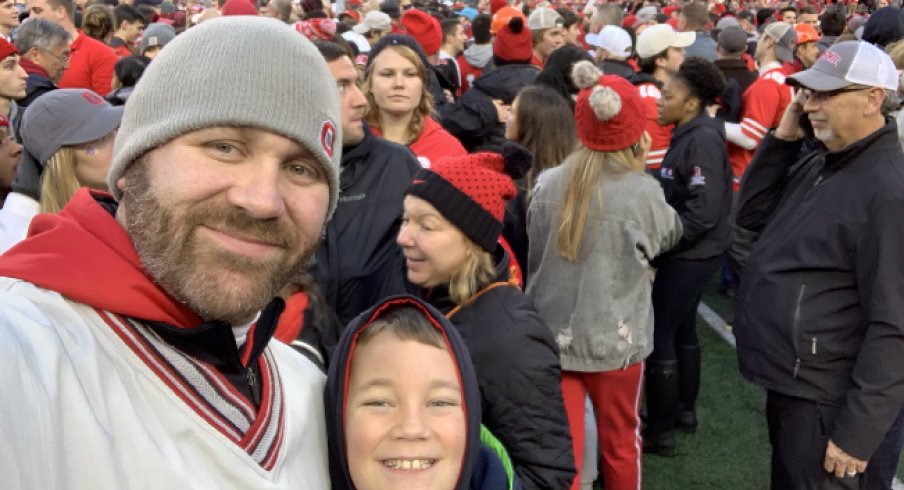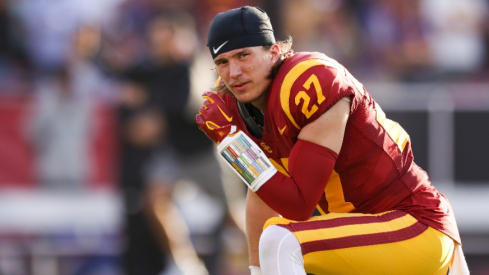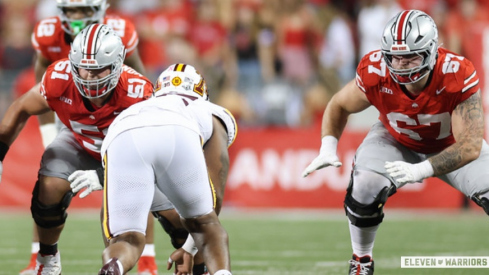Where Are They Now is a weekly series where we catch up with former Buckeyes to discuss their Ohio State experience and beyond.
Former defensive tackle Tim Anderson played for the Buckeyes from 1999-2003 and was a three-year starter. He was a team captain in 2002 and received All-American honors in 2003. He was drafted in the third round of the 2004 NFL draft to the Buffalo Bills, but decided to step away from professional football in 2009.
I caught up with him to chat more about his time as a leader at Ohio State and his career as a high school teacher and coach.
What would you say is your favorite memory from your time at Ohio State?
TA: That's a tough one. Obviously, it's tough to answer that, and with only one answer. To be honest, playing against Michigan in one of the greatest rivalries in college football or all of sports, really was pretty awesome, and that I got to start three of those games was pretty special. But obviously, the fact that when I was there, and I was the starter, we won the national championship.
So I kind of had to put those out there pretty close to each other. Because they're both pretty awesome. If we wouldn't have won a national championship, it would have definitely been Michigan.
What was it like to play on that big of a stage and in, arguably, one of the most controversial games in college football history?
TA: I mean, I think it had some added effect because there were a lot of people that felt we shouldn't have been there, that we didn't earn the right to be there because we had a lot of close games that year. I don't think there were a lot of analysts out there that felt like we deserved the number two spot in the polls that year but, it was obviously a special game. There was a lot at stake being in the national championship game plan playing Miami who had hands down for two years, been the number one team in the country just kind of destroyed everybody they played.
So that was obviously pretty cool and obviously winning the game, and I know that it was a very controversial call. I get all that, I understand that. But I guess my rebuttal to that is if Miami really was the best team in the country, they had the ball first and goal at the two-yard line in the very next series. This is the best team in the country, I feel like you should be able to move the ball two yards in four plays.
What have you been up to since stepping away from football?
TA: Well, I kinda, to be honest with you, I struggled a little bit with the next stage of my life, as far as what I was going to do and things of that nature. I had a history degree from Ohio State that I graduated with when I left, and so I kind of dabbled in some different things and ended up as a teacher and high school wrestling coach.
What made you want to become a teacher and coach?
TA: I would not have made it as far as I did athletically, even in high school getting to the position where I was able to attend a place like Ohio State and then be successful there and then make it to the NFL, if I hadn't had great teachers and coaches myself.
It wasn't just the coaches that did it. I mean, I had great teachers that spent extra time with me, helped me get the grades that I needed, to help me understand things. People were doing that, obviously, well before playing at Ohio State or the NFL or anything like that, because they just genuinely care and wanted me to have a chance at life and to have a better life and things of that nature.
Yes, some of the kids I worked with, obviously, are athletes. But some of them are just kids that are in my class that, and maybe I'm the only positive influence that's going to help them kind of get over a hard day or a hard time. Maybe walking into my class, they don't think they have the potential to go to college, and maybe by the time they're done, they think that it is something they might be able to do or at least try to achieve something more.
But just to have that positive influence, obviously, I don't reach all of the kids that I wish I could, but that's also I don't think realistic, but I feel like if I can get through a year and maybe make the difference for one kid, that's pretty awesome to kind of have that lasting effect.
And, the time and energy they spent with me to help me get to where I went, which is way beyond what I thought was even possible at certain times. It's just something I'm trying to kind of give back to kids now, to kind of pay that forward. To help kids reach their potential and reach what maybe they didn't think they could both academically in the classroom and athletically.
So would you say that your football career has translated over into your professional career? And if so, how?
TA: Oh, yeah, definitely. It's given me a wider range of perspectives. I think bringing stuff into the classroom and as a coach, I'm able to speak to things and do things in different perspectives because I also did some things in business and stuff like that.
So it's not just the sports or it's not just the subject matter in my class. It's how does this relate to certain careers and certain opportunities and stuff like that, especially when you teach history which is probably one of the least favorite subjects for kids. Teachers sometimes don't do a great job of explaining where it will apply in real life because a lot of teachers, and certainly no disrespect to them, but they go to college, they get their teaching degrees and they become teachers.
Well, I think that the experiences I had after college before becoming a teacher has played into how I run my room, how I have the rapport with my kids, and different things of that nature to help them realize I've done more than just be a teacher. That this stuff, even though we're talking about it here, that you may not think that it applies. But this will affect whatever you do down the road, whether it's how you communicate to your boss, how you write a report or whatever the case might be.
What was it like to be a leader at a powerhouse program like Ohio State?
TA: You'd have to talk to my teammates about my leadership abilities, but I was never a talkative guy. I feel like actions speak louder than words and I felt like that's how I was a leader because I would put the time in and I'd do the extra film studies. I would do things right. Doing those types of things to kind of show those younger guys.
A ton of great players have come through Ohio State, but don't forget, all of them were freshmen at one point that probably didn't understand football the way you need to, to be successful at a place like Ohio State that gives a lot more to the game than just going out there and running around and chase each other and try to get the ball. There are a lot of details and intricacies of the game that you have to learn and you have to learn how to study and watch for different things like that.
So just trying to be that leader in that sense of my actions. Being the first one in the weight room, the last one out. The first one in the film room, last one out, doing those types of things. And then when I was successful, hopefully those younger guys see all those extra steps, they see that you're doing things right, that you're not just talking about it, but you're actually doing it. They see that and they pick that up and then hopefully, do the same thing for those younger classes that are coming in, because, despite my accomplishments, to be quite honest, I don't feel like I was overly talented.
I don't believe I had a ton of skill compared to a lot of guys that came in. But I outworked guys. I studied the game. I was smarter because I understood what was coming and that was kind of my niche. I feel like I did those things that kind of made-up for my lack of speed, abilities or talent, things like that.


